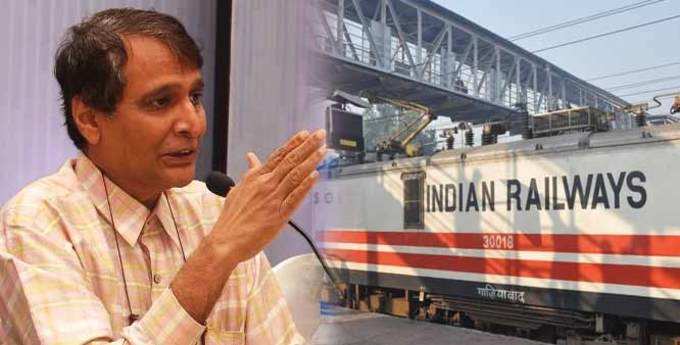 In this year’s Railway Budget,
In this year’s Railway Budget, However, it may be a bit of a stretch in view of the fact the Railways missed its revenue target this year and overall the performance has been dismal.
1) He garnered just Rs 1.67 lakh crore as opposed to his expectation of gross traffic receipts of Rs 1.83 lakh crore in FY 2016. He expects revenues at 1.84 lakh crore, 10% growth on FY16 revenues.
2) As far as passenger traffic goes, he had expected revenues to come in at Rs 50, 175 crore in FY2016, but it has come in at Rs 45, 834 crore. He now expects to see revenues at Rs 51,012 crore in FY 2017.
3) Freight revenues are worst hit. Rs 1.21 lakh crore was expected in FY 2016. But it has just been Rs 1.13 lakh crore. He has set freight revenue target at Rs 1.10 lakh crore for FY17, lower than the targeted revenue in FY16.
Overall, Suresh Prabhu has set gross revenue target at 1,84,820 crore for FY 2017, up 10% year-on-year.
Notably, The Railways is about to incur an additional Rs 33,000 crore on salaries each year due to the Seventh Pay Commission which has bumped up salaries and pensions of its employees by more than 20%.
However, Prabhu said he is expecting savings of Rs 8270 crore in FY 2016, which will compensate for the revenue shortfall in this fiscal year.
He also said the Railways is expected to meet an operating ratio (expenditure incurred for revenue earned) of 90% this fiscal, against a target of 89% laid out in the Budget last year. This means Railway will spend Rs 90 to earn Rs 100. Significantly, at the beginning of this year, the Indian Railways was spending as much as Rs 97.8 to earn Rs 100 – a sign of worsening financial health and an operating ratio level not seen in more than a decade. For the next Budget, he aims at 92% on account of “increased expenditure because of the 7th Pay Commission.”
Prabhu also reiterated that the
PROFITS AND LOSSES
Earnings from freight till December 2015 were 6.2% more than what it achieved in the same period last year, the earnings are short by Rs 2,150 crore of its own target of raking in Rs 82, 676 crore. The situation was even grimmer when it comes to volumes. The railways reportedly carried only 8 million tonnes of freight more than last year by December 2015 while its target is to ferry 85 million tonnes extra by March 2016 which looks almost impossible to achieve.
Similar was the case with passenger earnings which did not grow as much as expected, falling short of the target of Rs 35,042 crore by Rs 1,937 crore.
This is not where the Railways’ financial troubles ended – it’s where they began.
Moreover, the Railways knew it is about to incur an additional Rs 33,000 crore on salaries each year due to the Seventh Pay Commission. It now expects another 5 lakh personnel to retire in the coming decade, which means even more amount will have to be shelled out of its kitty in paying its former and current staff. Moreover, there is no clarity on the kind of expenditure the railway might actually end up incurring due to the seventh pay commission because there are many other allowances which haven't been taken into account, explained by Bibek Debroy, member of NITI Aayog. A large part of compensation is travel allowances which could add another Rs 8,000 crore.
While the Railways finds itself buried under its own finances, the problem of low-demand being unable to boost freight revenues further exacerbates the situation. , The freight revenue is not growing as fast as the railways expected because of slowing economy and lukewarm demand which has resulted in wagons, line capacity, engines going unused and only accumulating further losses on upkeep and depreciation.
Anticipating bleak situation, the railway minister had earlier even approached the finance ministry for additional funds but received a stern no for grant, followed by a 30% cut in the gross budgetary support from the central government. The finance ministry categorically rejected the Railways’ demand for grant in its communication and asked it to raise its own funds.
Over the past years, railways has increasingly been dependent on central government grants and gross budgetary allocation to carry out its capital expenditure and network expansion activities, in addition to meeting overhead expenses. Coupled with increasing borrowings, the future doesn’t seem too bright for Indian Railways. It’s to be seen how Suresh Prabhu gets a cash-strapped Railways back on track.